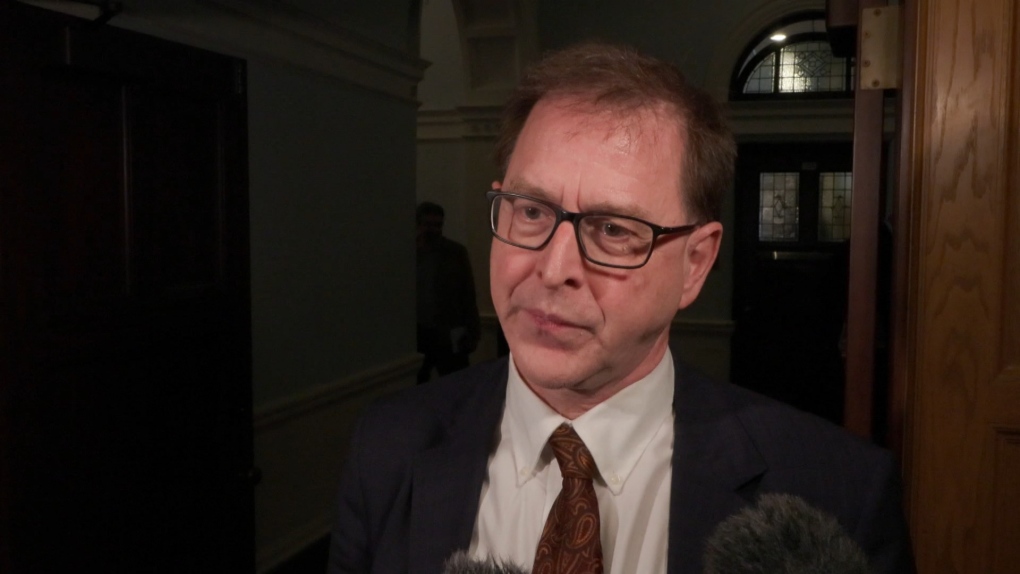Health minister touts 'extraordinary progress' as B.C. sees longest walk-in clinic wait times in Canada
 B.C. Health Minister Adrian Dix listens to a reporter's question at the provincial legislature on Wednesday, Feb. 21, 2024. (CTV)
B.C. Health Minister Adrian Dix listens to a reporter's question at the provincial legislature on Wednesday, Feb. 21, 2024. (CTV)
British Columbia walk-in clinics have the longest wait times in Canada, but the provincial health minister says the province has made "extraordinary progress" in providing primary care and is a model for the rest of the country.
Medimap – which is used by walk-in clinics in six provinces to publish information about their wait times – shared its annual Wait Time Index report on Wednesday.
According to the company, Canadians waited – on average – 68 minutes to see a doctor at a walk-in clinic in 2023. That was nearly double the average wait time Medimap recorded in 2022, which was 37 minutes.
In B.C., the average wait time rose from 79 minutes in 2022 to 93 minutes last year, according to Medimap.
The company's CEO Thomas Jankowski attributed B.C.'s performance to some of the province's efforts to improve primary care in recent years.
"B.C. has an unusual problem on its hands," Jankowski said in a statement announcing this year's report.
"Recent changes to the physician payment model have resulted in some walk-in clinics actually closing, exacerbating the very problem the change was trying to address. So while some people are getting better, more encompassing care if they get rostered at a medical clinic, those without one sometimes end up suffering more."
Earlier this month, B.C. Health Minister Adrian Dix touted the new physician payment model as part of the reason 708 more doctors were practising longitudinal family medicine this year than last.
More than 80 per cent of family doctors in the province have signed up for the new payment model, Dix said at the time.
He also said there are 237 new-to-practice doctors who have chosen family medicine, a figure that suggests the remaining 471 were moving into family practice from other health-care specialties, whether within the public system or outside it.
Asked about Medimap's report at the legislature on Wednesday, Dix acknowledged Jankowski's comments about the province's payment model, reframing them as a positive reflection on the direction of the province's health-care system.
"(The Medimap report is saying) the very success of our recruitment of family doctors may have an impact on episodic care," Dix said. "And we're working on that as well."
The health minister also reiterated his comments from earlier in the month about the recruitment of new doctors, and highlighted other measures the province has taken, such as expanding the scope of practice for pharmacists and building out the province's network of urgent and primary care centres.
"We continue to work with walk-in clinics," Dix said. "We have a stabilization plan, which has helped out a lot in clinics across the province."
The health minister also critiqued Medimap's study, noting that not all walk-in clinics use the company's services, and asserting that B.C.'s efforts to transform its health-care system are a model for the rest of Canada.
"With respect to this report, as you know, it's a partial report," Dix said. "It's people who are their clients and, obviously, in part, it's to promote their services. All that is fine, but the progress in British Columbia is something that the whole country is looking at."
CTVNews.ca Top Stories

More than 115 cases of eye damage reported in Ontario after solar eclipse
More than 115 people who viewed the solar eclipse in Ontario earlier this month experienced eye damage after the event, according to eye doctors in the province.
Toxic testing standoff: Family leaves house over air quality
A Sherwood Park family says their new house is uninhabitable. The McNaughton's say they were forced to leave the house after living there for only a week because contaminants inside made it difficult to breathe.
Decoy bear used to catch man who illegally killed a grizzly, B.C. conservation officers say
A man has been handed a lengthy hunting ban and fined thousands of dollars for illegally killing a grizzly bear, B.C. conservation officers say.
B.C. seeks ban on public drug use, dialing back decriminalization
The B.C. NDP has asked the federal government to recriminalize public drug use, marking a major shift in the province's approach to addressing the deadly overdose crisis.
OPP responds to apparent video of officer supporting anti-Trudeau government protestors
The Ontario Provincial Police (OPP) says it's investigating an interaction between a uniformed officer and anti-Trudeau government protestors after a video circulated on social media.
An emergency slide falls off a Delta Air Lines plane, forcing pilots to return to JFK in New York
An emergency slide fell off a Delta Air Lines jetliner shortly after takeoff Friday from New York, and pilots who felt a vibration in the plane circled back to land safely at JFK Airport.
Sophie Gregoire Trudeau on navigating post-political life, co-parenting and freedom
Sophie Gregoire Trudeau says there is 'still so much love' between her and Prime Minister Justin Trudeau, as they navigate their post-separation relationship co-parenting their three children.
Last letters of pioneering climber who died on Everest reveal dark side of mountaineering
George Mallory is renowned for being one of the first British mountaineers to attempt to scale the dizzying heights of Mount Everest during the 1920s. Nearly a century later, newly digitized letters shed light on Mallory’s hopes and fears about ascending Everest.
Loud boom in Hamilton caused by propane tank, police say
A loud explosion was heard across Hamilton on Friday after a propane tank was accidentally destroyed and detonated at a local scrap metal yard, police say.






























